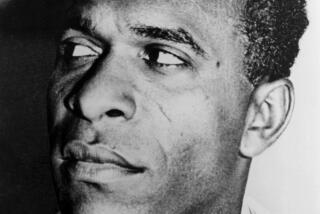Sacred Rage : THE WRATH OF MODERN ISLAM by Robin Wright (Linden: $17.95; 315 pp.) : RADICAL ISLAM by Emmanuel Sivan (Yale University: $18.50; 230 pp.)
These two books, as their titles signify, are both about the same subject, Islam in the contemporary world, and specifically that aspect of it that may be called militant Islam. Otherwise the books are not in the same universe of discourse. Emmanuel Sivanâs book is a serious, learned study, while Robin Wright has produced a well-intentioned, interesting, even entertaining journalistic potboiler.
Wright has extensive first-hand knowledge of the Middle East, having spent many years in the area for several reputable newspapers. So in the first 242 pages of her book she gives us vivid quasi-eyewitness descriptions of hijackings, car bombings and assassinations carried out by militant Muslims in Iran, Kuwait, Saudi Arabia, Lebanon and Egypt--with a good deal of background information on the perpetrators and the movements they belong to. She presents us with a single overall Islamic thrust composed, however, of separate indigenous movements. Good, useful stuff for anyone who wants to put Middle Eastern happenings into a more knowledgeable framework than that of the U.S. television screen. She brings her story down to as close as mid-1985. But it still remains true that there is nothing so out of date as yesterdayâs newspaper, unless it be day-before-yesterdayâs newspaper.
During the course of her narrative, Wright takes sundry sideswipes at âWashingtonâ and the State Department for errors of policy and handling. In her final chapter, âThe Options: The United States,â she makes a sound appraisal of and sensible recommendations for U.S. policy, especially toward Iran. Her suggestions to the policy makers are: Keep calm, do not react hastily, above all do not reach for the gun; try to find out why militant Muslims act the way they do; try to understand the whole picture. Yet the cure she proposes would be ineffective because her diagnosis of the ailment afflicting U.S. policy is incomplete.
She asserts that the United States is generally disliked because as a big power it is assertive and intrusive and because its way of life is seductive and destructive of traditional culture and value systems. True, but Wright is too intelligent and has been too long in the region not to know that the main cause of hostility toward America is the U.S. policy of unconditional support of Israel, perceived by Arabs and Muslims everywhere as their main enemy. She refers to the Israeli connection in just two sentences first as âa major cause of the militantsâ wrathâ and then as âalmost . . . a secondary issue.â She quotes a State Department adviser, Marvin Zonis, in support of her thesis on the secondary nature of the Israel factor.
If the State Department accepts this sort of superficial advice, itâs future failures of policy will be even more painful than past ones. Recently scrawled graffiti seen last month by this reviewer on the walls of the former U.S. Embassy in Tehran still abuse the United States as âThe Great Satanâ even though there has been no U.S. presence in Iran for six years. Why? Because of unfinished business in Palestine and Jerusalem. To deny the primacy of Israel in the motivation of the militants is not just ignorance, it is pusillanimity, to put it politely. Wright commits two serious and disturbing errors of terminology.
Emmanuel Sivan, an Israeli scholar--he is professor of history in the Hebrew University--gives us a work of genuine, original scholarship. Sivan has studied, with impressive thoroughness and in the original Arabic, the writings of the leaders and thinkers of the militant Islamic groups in Egypt, Syria and Lebanon. Except for the late, lamented Richard Mitchellâs invaluable book on the Egyptian Muslim Brotherhood, published as far back as 1969, this is the first time that such a survey has been presented in English. Not just scholars but everyone seriously interested in the contemporary Middle East is in Sivanâs debt, for his work is written in a clear and fluent style. In his preface, Sivan apologizes for the fact that âfield surveys of the radical phenomenon are unfortunately impossibleâ--presumably for him as an Israeli citizen, with whom the militants would not meet or talk. He need not have apologized, for his findings, even at secondhand, are illuminating.
Sivan lays out before us the thinking of the militant theoreticians on what they consider their immediate enemies: the nation state, secularism, Westernization and modernity, consumerism and the corrupting influence of trivial media. It is an impressive account of soul-searching and chest-beating conducted in a mood of anger and despair. Despair because, according to the militant thinkers whom he quotes, there is no way out of the present position of decline in which Islam finds itself today. None of the alternatives work--not withdrawal from modern Muslim society, not the long-term regeneration of that society through education, not the capture of Muslim state power by violent means.
Yet despite this pessimistic prognosis, Sivan, perhaps despite himself, convinces us that the militantsâ analysis is correct and that ultimately their cause must prevail, simply for lack of any effective alternative. The motivations of the militants are deeply rooted in the Islamic past, and their movement is not something that will go away. As a whole, Sivanâs presentation is unduly pessimistic and negative because he deals almost exclusively with the militantsâ criticisms and not, as Mitchell did, with their positive programs of reform.
Sivan has one thing in common with Wright: He underestimates the impact of Israel on militant thinking. It is true that in his first chapter he refers to the overwhelming importance of the Israeli issue for the militants, but he makes no further mention of it. And in one of his subsections entitled âNo to Jihad,â he suggests that the militants, at one time, did not consider Israel their primary enemy. That line of thought is out of date and has been abandoned, as is shown by current happenings in south Lebanon and on the West Bank and by all those violent happenings described by Wright.
More to Read
Sign up for our Book Club newsletter
Get the latest news, events and more from the Los Angeles Times Book Club, and help us get L.A. reading and talking.
You may occasionally receive promotional content from the Los Angeles Times.







